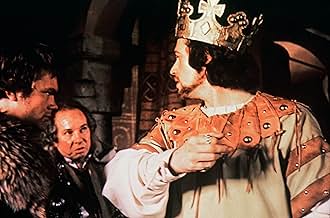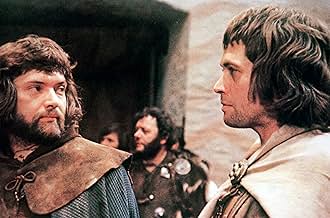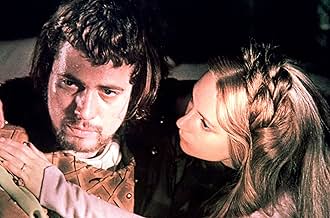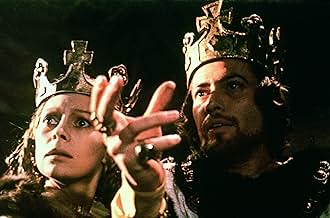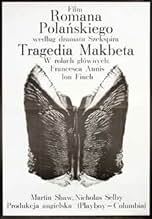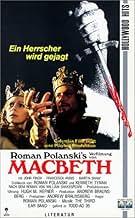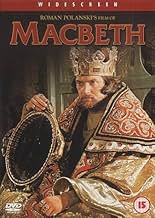A ruthlessly ambitious Scottish lord seizes the throne with the help of his scheming wife and a trio of witches.A ruthlessly ambitious Scottish lord seizes the throne with the help of his scheming wife and a trio of witches.A ruthlessly ambitious Scottish lord seizes the throne with the help of his scheming wife and a trio of witches.
- Director
- Writers
- Stars
- Won 1 BAFTA Award
- 3 wins & 2 nominations total
- Director
- Writers
- All cast & crew
- Production, box office & more at IMDbPro
7.415.8K
1
2
3
4
5
6
7
8
9
10
Featured reviews
Something wicked this way comes
Dark, bloody and brooding version of Shakespeare's play about a doomed Scottish king who was, according to his wife, Lady MacBeth "too full of the milk of human kindness to catch the nearest way". This is one of Shakespeare's later plays and is entirely devoid of some of the lighter moments prevalent in his earlier work.
Macbeth, a loyal Scottish thane and a cousin of King Duncan, is waylaid with his companion, Banquo, by three witches who prophesise that he will become king and that Banquo will beget kings. Once MacBeth has informed his wife of these predictions, he is propelled by her and by his own lust for power on a journey of self-destruction leading ultimately to madness. In his determination to bring about the witches' predictions, he kills his liege-lord, steals the crown from the rightful heirs, who flee into exile on suspicion of regicide and patricide, then orders the secret murder of ally and friend Banquo and Banquo's son Fleance. So begins a descent into a nightmare existence, replete with ghostly apparitions, sleepless angst and withering self-doubt. Gradually mutual distrust emerges between himself and the nobles whose support maintains his position, and eventually he murders the wife and children of one MacDuff, an act which symbolises the horror he has become. MacDuff, along with other Scottish nobles, has joined the exiled heir, Malcolm, who lives under the protection of the English king. An army of rebellion - or liberation - is brought to bear on MacBeth's stronghold, whilst inside, MacBeth has begun "to grow aweary of the sun". The witches have told him that he cannot be killed by any "man of woman born". But, in the final fight scene, he learns too late that MacDuff "was, from his mother's womb, untimely ripped" and that the witches have, in Banquo's words from the start of the play, won him "with honest trifles" and betrayed him "in deepest consequence", and his destruction is complete.
This is a suitably melancholic reading, full of images of blood, of sombre leaden skies, of torrential downpours and of thickset, bearded nobles. Scotland is presented as a gloomy outcrop on the edge of the known world and the sun has been heavily filtered by Polanski, giving the film a surreal and eerie feel and stressing the superstitious environment in which the play is set. We are also treated to a fair representation of the early Middle Ages, a time when travelling lords and ladies and their kith and kin slept communally on straw in the great halls, side by side with their massive hunting dogs.
The obviously archaic dialogue has been abridged and everso slightly updated for modern audiences. The lines are delivered eloquently by the two leads, Jon Finch and Francesca Annis, who are well matched as the doomed couple, and this clipped entry would be a good introduction to Shakespeare for those of the MTV-set with a literary inclination. All in all a good stab at bringing Shakespeare into the twentieth century and an effort which the bard himself might well have smiled upon.
Macbeth, a loyal Scottish thane and a cousin of King Duncan, is waylaid with his companion, Banquo, by three witches who prophesise that he will become king and that Banquo will beget kings. Once MacBeth has informed his wife of these predictions, he is propelled by her and by his own lust for power on a journey of self-destruction leading ultimately to madness. In his determination to bring about the witches' predictions, he kills his liege-lord, steals the crown from the rightful heirs, who flee into exile on suspicion of regicide and patricide, then orders the secret murder of ally and friend Banquo and Banquo's son Fleance. So begins a descent into a nightmare existence, replete with ghostly apparitions, sleepless angst and withering self-doubt. Gradually mutual distrust emerges between himself and the nobles whose support maintains his position, and eventually he murders the wife and children of one MacDuff, an act which symbolises the horror he has become. MacDuff, along with other Scottish nobles, has joined the exiled heir, Malcolm, who lives under the protection of the English king. An army of rebellion - or liberation - is brought to bear on MacBeth's stronghold, whilst inside, MacBeth has begun "to grow aweary of the sun". The witches have told him that he cannot be killed by any "man of woman born". But, in the final fight scene, he learns too late that MacDuff "was, from his mother's womb, untimely ripped" and that the witches have, in Banquo's words from the start of the play, won him "with honest trifles" and betrayed him "in deepest consequence", and his destruction is complete.
This is a suitably melancholic reading, full of images of blood, of sombre leaden skies, of torrential downpours and of thickset, bearded nobles. Scotland is presented as a gloomy outcrop on the edge of the known world and the sun has been heavily filtered by Polanski, giving the film a surreal and eerie feel and stressing the superstitious environment in which the play is set. We are also treated to a fair representation of the early Middle Ages, a time when travelling lords and ladies and their kith and kin slept communally on straw in the great halls, side by side with their massive hunting dogs.
The obviously archaic dialogue has been abridged and everso slightly updated for modern audiences. The lines are delivered eloquently by the two leads, Jon Finch and Francesca Annis, who are well matched as the doomed couple, and this clipped entry would be a good introduction to Shakespeare for those of the MTV-set with a literary inclination. All in all a good stab at bringing Shakespeare into the twentieth century and an effort which the bard himself might well have smiled upon.
very good adaptation
Roman Polanski's blood-soaked version of Shakespeare's Scottish play was the video version of choice when we were studying this at school, in spite of it having a nude Lady Macbeth and witches (and Keith Chegwin in the cast - he's Banquo's son).
Jon Finch has the lead and he is exceptionally good. Even a dagger which really appears to float before him (an effect not needed) doesn't spoil things. Odd that he never really got good movie roles after this. His Lady M is Francesca Annis, a spider of a schemer, also putting in a good performance.
Less adequate are Martin Shaw as Banquo, Stephan Chase as Malcolm, and Sydney Bromley as the Porter, although Terence Bayler gives good value as Macduff.
Perhaps this Macbeth is the first one to be truly cinematic, something that even Orson Welles couldn't achieve with Scots accents and Scandinavian settings. It remains memorable long after seeing and, in its excesses, opens up the text for a new generation, and finally, sees the repellent murdering usurper get what he deserves.
(Incidentally for perspective, the book 'Macbeth - man and myth' by Nick Aitchison looks at the real historic facts in accessible coffee-table book style).
Jon Finch has the lead and he is exceptionally good. Even a dagger which really appears to float before him (an effect not needed) doesn't spoil things. Odd that he never really got good movie roles after this. His Lady M is Francesca Annis, a spider of a schemer, also putting in a good performance.
Less adequate are Martin Shaw as Banquo, Stephan Chase as Malcolm, and Sydney Bromley as the Porter, although Terence Bayler gives good value as Macduff.
Perhaps this Macbeth is the first one to be truly cinematic, something that even Orson Welles couldn't achieve with Scots accents and Scandinavian settings. It remains memorable long after seeing and, in its excesses, opens up the text for a new generation, and finally, sees the repellent murdering usurper get what he deserves.
(Incidentally for perspective, the book 'Macbeth - man and myth' by Nick Aitchison looks at the real historic facts in accessible coffee-table book style).
10gerlynga
Medieval accuracy, good Shakespeare
A few years after this was released in the USA, I convinced my high school English teacher to take our class to see it. (In the days before videos & vcr's, this involved renting a theater and print.) I was glad I did. It is certainly the most real and immediate filmed version of the play. The sets, costumes (or lack thereof), and casting all work to create an accurate depiction of "nasty, brutal, and short" 11th century life. And of course, there is the wonderful insight of Shakespeare's language to engage our modern sensibilities.
One can only thank Polanski for casting such relatively young actors as his leads. Kings lived and died young then, and had to be both excellent generals as well as administrators to succeed. Jon Finch is both athletic and impassioned enough to carry off the soldiering, and young and introspective enough to be moved by his wife both as a woman and co-conspirator. Of course Francesca Annis made a splash by doing the mad scene in the nude--but in medieval times, everyone slept in the nude, so it was certainly accurate to the times.
And as has been noted before, at least the castle keeps are cold, dark, and dirty. The communal sleeping arrangements, straw bedding, flaring smoky torches, seeping walls, and muddy yards all contribute to the historical accuracy of this production. The exterior of Bamburgh also works. And keeping with Shakespeare's light vs. dark metaphors, the mist, rain, and lowering skies combine to enhance the mood.
What happens in this "Macbeth" is as realistic as possible. So what happens offstage in the play, happens onstage in the film: the murders of Duncan, Banquo, Macduff's family. Murder is nasty and bloody and Polanski (having much experience of its results) makes sure we know it. Medieval Scotland was nasty and bloody as well, and if the film is accurate in depicting its setting, why not the action? And only Polanski has an ending that hints that violence and ambition didn't die with Macbeth's overthrow. All said, Polanski's film still has the most accurate medieval setting, engaging performance(s), and thrilling battles.
PS. For those interested in the real historical Macbeth, read Dorothy Dunnett's excellent biographical novel "King Hereafter". Dunnett is world renowned for her historical accuracy, and did much research to create not only a very plausible rendition, but a thoroughly interesting and entertaining story as well.
One can only thank Polanski for casting such relatively young actors as his leads. Kings lived and died young then, and had to be both excellent generals as well as administrators to succeed. Jon Finch is both athletic and impassioned enough to carry off the soldiering, and young and introspective enough to be moved by his wife both as a woman and co-conspirator. Of course Francesca Annis made a splash by doing the mad scene in the nude--but in medieval times, everyone slept in the nude, so it was certainly accurate to the times.
And as has been noted before, at least the castle keeps are cold, dark, and dirty. The communal sleeping arrangements, straw bedding, flaring smoky torches, seeping walls, and muddy yards all contribute to the historical accuracy of this production. The exterior of Bamburgh also works. And keeping with Shakespeare's light vs. dark metaphors, the mist, rain, and lowering skies combine to enhance the mood.
What happens in this "Macbeth" is as realistic as possible. So what happens offstage in the play, happens onstage in the film: the murders of Duncan, Banquo, Macduff's family. Murder is nasty and bloody and Polanski (having much experience of its results) makes sure we know it. Medieval Scotland was nasty and bloody as well, and if the film is accurate in depicting its setting, why not the action? And only Polanski has an ending that hints that violence and ambition didn't die with Macbeth's overthrow. All said, Polanski's film still has the most accurate medieval setting, engaging performance(s), and thrilling battles.
PS. For those interested in the real historical Macbeth, read Dorothy Dunnett's excellent biographical novel "King Hereafter". Dunnett is world renowned for her historical accuracy, and did much research to create not only a very plausible rendition, but a thoroughly interesting and entertaining story as well.
certainly not a sunny story, but it's as darkly exhilarating and ominous as any Shakespeare adaptation can get
To get the obvious out of the way- Roman Polanski directed Macbeth as the first film following the death of his wife, Sharon Tate, and unborn child at the hands of Charles Manson's gang. That factor in the film- not least of which in small details, like the first shot after the opening credits where a man finishing slaying someone looks just like Manson, beard and all- is undeniable, but it shouldn't be counted as the sole influence. Aside from the purging, as far as I can figure, Polanski was doing for himself by going all out in showing the frank and bloody depictions of violence and almost cleansing (as Lady Macbeth would do in madness) of blood on hands that could never come off, of the sort of psychological impact of violence and its aftermath, it was a bloody time in the world and in films. As Vietnam continued to go on, the best films of 1971- and Macbeth could be counted as one of them- were some of the most stylish and explicit in how they attacked systems of government, corruption, and bad-ass anti-heroes or outright villains (A Clockwork Orange and Dirty Harry come immediately to mind). It would practically be dishonest, in a sense, for Polanski not to show how grotesque the acts of murder that, for example, Macbeth's men do on MacDuff's family and servants, or the simple, sadistic carnage of Macbeth's final curtain call in the climax, considering the mood and controversies of the period.
Compared to some of the really radical films of the year, however, Macbeth's story is as old and cherished as children's fables. Yes, children, you all remember the story of ambitious young Macbeth, prodded on by the alleged prophecies of three weird witches, who murders the king by his own (and his wife's) accord, and soon goes mad as power grips him into overreaching his domain and believing himself to be invincible to all but a fleet of woods. Not really too much happiness in Shakespeare's work, and all the better, as it might be his masterpiece: a saga of the frailties of the human conscience and abstractions of consciousness, where the supernatural substitutes just as well for faith in some religious calling- and a questioning and doubt throughout- and what it does to those around the Mr & Mrs who still can't cope deep down with killing a man in the dead of night. Yet even more incredible is that Polanski, as well as Kurosawa with Throne of Blood, enrich the material with the film adaptations, changing around some scenes, omitting some altogether, and offering brands of surrealism based on preferred styles.
While Kurosawa stuck to the Noh method for much of his film, Polanski's Macbeth is an atmospheric milestone as far as concrete production design can go (never once does it feel like they used a fake castle, or much of a fake set even), and all the grays and dark Earth colors, especially when Macbeth goes to the witches a second time, blend into something that matches the psychological conundrum of the king of Scotland and his desperate wife. But seeing Polanski take things further, with touches of the bizarre (the floating and illusionary dagger, the drops of blood in Lady's hands, and the spectacular scene of Macbeth seeing through the windows, shot in a hazy and pirouetting camera), and showing what was only alluded to in strange and exciting ways- the killing scene in the bedroom feels almost like the Psycho shower scene, missed stabs and the messy quality of it all, only from the guilty party's point of view. This, plus the attention to detail in storytelling, the nuanced and gleefully over-the-top dialog provided very close to the original text, and even hand-held camera-work right out of something in Repulsion, makes this a work of daring for Polanski, not simply in the realm of elaborate fights (though there is that) or blood-shed (a lot of that) or decapitations (one or two gushing ones).
Though not to forget as part of the success too, aside from the director's total control of mis-en-scene, are the actors. Jon Finch, who also appeared in Frenzy, is a tightly wound loose cannon, if that makes sense, whose voice-over narration sometimes blends in with talking to himself, and the look in his eyes sometimes tells all, or perhaps not, as case might be. Although Welles and Mifune have their fair share of great Macbeth points in other films, Finch proves himself as on their same level, if only for this one moment in his career. Also very noteworthy (albeit such a meaty part for any actress) is Francessa Annis as Lady Macbeth, and Terence Baylor as MacDuff, and Stephan Chase as Malcolm is a very good choice. And as usual Polanski populates his picture with effective faces, strange looks that seem very conventional and at the same time all apart of the visual and mood. I loved seeing the whole room of witches, most naked (thanks to Hugh Hefner mayhap), and it almost seeming as if a bare minimum of make-up was used.
Bottom line, if you're looking for a hallmark of the dark literary drama, or a disturbing tale of the madness of power, or just a classic Polanski film, it's all here.
Compared to some of the really radical films of the year, however, Macbeth's story is as old and cherished as children's fables. Yes, children, you all remember the story of ambitious young Macbeth, prodded on by the alleged prophecies of three weird witches, who murders the king by his own (and his wife's) accord, and soon goes mad as power grips him into overreaching his domain and believing himself to be invincible to all but a fleet of woods. Not really too much happiness in Shakespeare's work, and all the better, as it might be his masterpiece: a saga of the frailties of the human conscience and abstractions of consciousness, where the supernatural substitutes just as well for faith in some religious calling- and a questioning and doubt throughout- and what it does to those around the Mr & Mrs who still can't cope deep down with killing a man in the dead of night. Yet even more incredible is that Polanski, as well as Kurosawa with Throne of Blood, enrich the material with the film adaptations, changing around some scenes, omitting some altogether, and offering brands of surrealism based on preferred styles.
While Kurosawa stuck to the Noh method for much of his film, Polanski's Macbeth is an atmospheric milestone as far as concrete production design can go (never once does it feel like they used a fake castle, or much of a fake set even), and all the grays and dark Earth colors, especially when Macbeth goes to the witches a second time, blend into something that matches the psychological conundrum of the king of Scotland and his desperate wife. But seeing Polanski take things further, with touches of the bizarre (the floating and illusionary dagger, the drops of blood in Lady's hands, and the spectacular scene of Macbeth seeing through the windows, shot in a hazy and pirouetting camera), and showing what was only alluded to in strange and exciting ways- the killing scene in the bedroom feels almost like the Psycho shower scene, missed stabs and the messy quality of it all, only from the guilty party's point of view. This, plus the attention to detail in storytelling, the nuanced and gleefully over-the-top dialog provided very close to the original text, and even hand-held camera-work right out of something in Repulsion, makes this a work of daring for Polanski, not simply in the realm of elaborate fights (though there is that) or blood-shed (a lot of that) or decapitations (one or two gushing ones).
Though not to forget as part of the success too, aside from the director's total control of mis-en-scene, are the actors. Jon Finch, who also appeared in Frenzy, is a tightly wound loose cannon, if that makes sense, whose voice-over narration sometimes blends in with talking to himself, and the look in his eyes sometimes tells all, or perhaps not, as case might be. Although Welles and Mifune have their fair share of great Macbeth points in other films, Finch proves himself as on their same level, if only for this one moment in his career. Also very noteworthy (albeit such a meaty part for any actress) is Francessa Annis as Lady Macbeth, and Terence Baylor as MacDuff, and Stephan Chase as Malcolm is a very good choice. And as usual Polanski populates his picture with effective faces, strange looks that seem very conventional and at the same time all apart of the visual and mood. I loved seeing the whole room of witches, most naked (thanks to Hugh Hefner mayhap), and it almost seeming as if a bare minimum of make-up was used.
Bottom line, if you're looking for a hallmark of the dark literary drama, or a disturbing tale of the madness of power, or just a classic Polanski film, it's all here.
one of the mightiest adaptations from Shakespeare's :p
Vehement and inch-perfect approach of Roman Polanski towards Shakespeare's greatest play "Macbeth". Polanski's absolute narrative technique and profound direction set the heinous deed of Macbeth and his tragic fate with elegance.
He brilliantly represents all Shakespearean symbols on the screen--- especially the floating "dagger", apparitions in the witches' den. Jon Finch powerfully portrays the downfall of Macbeth while Annis appears vivid struggling with her greed and conscience. Vibrantly, one of the mightiest adaptations from Shakespeare's :p
8/10__:D
He brilliantly represents all Shakespearean symbols on the screen--- especially the floating "dagger", apparitions in the witches' den. Jon Finch powerfully portrays the downfall of Macbeth while Annis appears vivid struggling with her greed and conscience. Vibrantly, one of the mightiest adaptations from Shakespeare's :p
8/10__:D
Did you know
- TriviaMark Dightam, who was eleven when he controversially appeared full frontally naked as MacDuff's son, was not allowed to see the film when it was released because it had been classified AA and he was under 14 at the time.
- GoofsThe lyrics to the song that Fleance sings at Macbeth's banquet for Duncan at Inverness are taken from the poem "Merciles Beautè" by Geoffrey Chaucer. In the context of the film this extraneously inserted song is itself an anachronism, as Chaucer lived in the fourteenth century and Shakespeare's "Macbeth" historically takes place in the eleventh century.
- ConnectionsFeatured in Aquarius: Two Macbeths/Hayward Gallery/Ravi Shankar (1972)
Details
- Release date
- Countries of origin
- Official site
- Language
- Also known as
- Bi Kịch Của Macbeth
- Filming locations
- Lindisfarne Castle, Holy Island of Lindisfarne, Northumberland, England, UK(Glamis Castle, Inverness)
- Production companies
- See more company credits at IMDbPro
Box office
- Budget
- $3,100,000 (estimated)
- Runtime
- 2h 20m(140 min)
- Color
- Aspect ratio
- 2.35 : 1
Contribute to this page
Suggest an edit or add missing content


